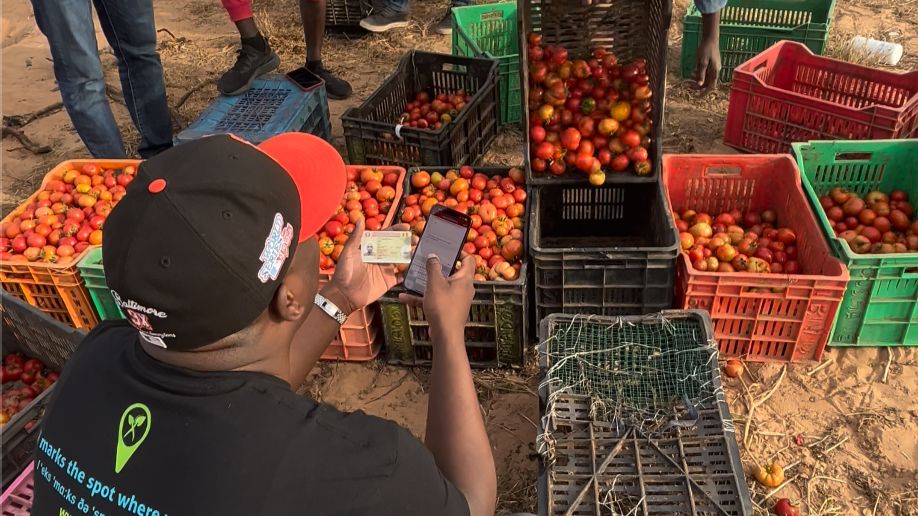
Alexander Zanders is Founder & CEO at UfarmX ® (Techstars ’24) – an AgTech company dedicated to transforming agriculture in Africa by empowering smallholder farmers through advanced technology and innovative solutions.
In his piece (original article here), he shares about the immense opportunities and challenges in Africa’s agricultural sector, emphasising that with nearly 70% of the world’s remaining arable land and over 500 million smallholder farmers, Africa holds the key to meeting global food demand.
He discusses:
1. How technology can bridge gaps in financial inclusion and market access.
2. The critical role of data-driven solutions in empowering farmers.
3. Why cutting out inefficiencies is essential for businesses to thrive.
Africa’s agricultural sector isn’t just a growth opportunity, Zander says—it’s a chance to build a more equitable and sustainable food system.
Why pure tech approaches are failing African farmers
The promise of Africa’s agricultural sector represents the world’s largest growth opportunity across all sectors. The continent holds nearly 70% of the planet’s remaining arable land, with estimates up to 600 million smallholder farmers producing 80% of Africa’s agricultural production. Yet despite this immense potential, these farmers remain dramatically underutilized, trapped in cycles of low productivity that prevent the continent from meeting both local and global food demands.
The stark reality is reflected in the numbers: African farmers produce at a rate 11 times lower per acre than their Western counterparts. Meanwhile, over 90% of farmers in Sub-Saharan Africa lack access to institutional finance, creating a cycle of underinvestment that perpetuates low productivity. The agribusiness market, projected to grow from approximately $500 billion to $1 trillion annually by 2029, represents an unprecedented opportunity for transformation – if we can solve the fundamental challenges facing smallholder farmers.

Traditional technology approaches have failed to bridge this gap. Across Nigeria, Senegal, and Liberia, a pattern emerges that challenges conventional wisdom about agricultural digitization. While some AgTech companies arrive with sophisticated platforms promising to revolutionize farming through mobile apps, AI-driven optimization, and digital payments, the fundamental metrics remain stubbornly unchanged. African farmers continue to produce at rates 11 times lower than their Western counterparts, and over 90% still lack access to institutional finance. The disconnect between technological promise and practical reality raises a crucial question: what are we missing in our approach to agricultural transformation?
The answer lies in understanding the intricate web of relationships, traditions, and practical constraints that define African agriculture. A smallholder farmer’s success depends not just on better technology, but on a complex ecosystem of trusted buyers, reliable input suppliers, and practical knowledge networks. Pure digital solutions, no matter how well-designed, often fail to address these fundamental needs.
This is where UfarmX ® (Techstars ’24) ‘s data across 5,000+ farmers reveals a crucial insight: effective agricultural transformation requires combining technology with strong human networks. Our success in tripling yields and more than doubling farmer revenues comes not just from digital tools, but from a hybrid approach that emphasizes personal engagement alongside technological solutions.
Beyond Apps: Building Trust and Infrastructure in African Agriculture
The importance of this human element becomes particularly apparent when considering infrastructure challenges. Rural Africa’s limited internet connectivity, unreliable power supply, and low smartphone penetration mean that sophisticated apps often fail to reach their intended users. Successful programs must adapt to these realities rather than trying to override them. UfarmX’s approach of combining USSD technology with smartphone applications, supported by strong local networks, has achieved engagement rates above 96% across diverse regions.
This human-centric approach proves particularly crucial in data collection, where accuracy can make or break agricultural initiatives. With farmer profiles including photographs and GPS coordinates collected by local agents, the platform creates unparalleled insights for stakeholders across the agricultural value chain. These verified profiles enable everything from improved crop forecasting to better-informed lending decisions by financial institutions.
The impact of this hybrid approach becomes even more pronounced when addressing climate-smart agriculture. Pure technology solutions often struggle to implement climate-smart practices effectively because they lack local context and cultural understanding. Success requires a deep appreciation of local farming traditions, personal guidance in adopting new techniques, and community-level buy-in. UfarmX’s integration of climate-smart advisory services with personal guidance has proven essential for helping farmers adapt to changing environmental conditions while improving their yields.
The market access challenge further reveals why pure digital solutions fall short. While many AgTech platforms promise to connect farmers directly to buyers through digital marketplaces, the reality of African agricultural markets demands a more nuanced approach. African businesses lose up to $100 billion annually to unnecessary middlemen, yet simply digitizing connections isn’t enough. Successful market linkages require a delicate balance of technology and trust-building that only a hybrid approach can provide.
This is particularly evident in UfarmX’s approach to first-mile traceability. By combining digital tracking with personal verification through local agents, the platform provides buyers with unprecedented visibility into their supply chains. This comprehensive approach, which includes individual farmer photographs and precise GPS locations, creates transparency that pure digital solutions cannot match. The World Bank’s recognition of UfarmX’s traceability work in Liberia demonstrates the effectiveness of this hybrid model.
Financial inclusion represents perhaps the most crucial test of agricultural transformation approaches. While digital financial services promise to revolutionize farmer banking, UfarmX’s experience shows that creating truly “bankable” farmer profiles requires more than just digital documentation. By combining verified production history with personal verification through local agents, our platform helps bridge the critical gap between farmers and financial institutions. This approach creates immutable profiles for farmers engaged in informal business practices, providing them with a key to unlock access to financial institutions that would otherwise remain out of reach.
The power of this comprehensive approach is evident in UfarmX’s results. Working with 5,000+ farmers across 20,000+ acres, our platform has achieved consistent yield increases of 300%. These improvements aren’t just numerical achievements – they represent real progress toward food security and economic resilience in regions where traditional approaches have struggled to deliver results.
Looking at Africa’s broader agricultural potential, the stakes couldn’t be higher. The global population is set to increase by 2.2 billion by 2050, requiring 70% more food production than current levels. Africa’s vast arable land represents an unprecedented opportunity to meet this challenge, but success will require moving beyond simplistic technological solutions to embrace more nuanced, hybrid approaches.
The Path Forward: A Blueprint for Agricultural Transformation
The way forward for organizations committed to African agricultural transformation requires a clear-eyed focus on proven approaches. Drawing from UfarmX’s documented success across three countries, several concrete implementation principles emerge.
First, technology must serve as an enabler rather than a replacement for human relationships. The platform’s verified farmer database, complete with photographs and GPS locations, demonstrates how digital tools can enhance rather than supplant traditional agricultural networks. This comprehensive documentation creates transparency and trust throughout the value chain, from farmers to financial institutions to end buyers.
Second, local support networks are essential for success. UfarmX’s agent-based model shows how community-based representatives can bridge the gap between digital solutions and practical farming realities. These agents don’t just facilitate technology adoption – they help integrate climate-smart practices, verify crop quality, and build trust with potential buyers.
The importance of climate-smart agriculture cannot be overstated. With the world needing 70% more food production by 2050, Africa’s vast arable land represents a crucial opportunity. But this potential can only be realized through approaches that combine environmental sustainability with economic viability.
Organizations entering this space should focus on several key metrics:
- Farmer engagement rates
- Yield improvements
- Revenue growth
- Environmental impact
- Market access
The financial opportunity is substantial. With Africa’s agribusiness market projected to reach $1 trillion annually by 2029, organizations that successfully implement these principles stand to capture significant value while driving meaningful change.
Ultimately, successful agricultural transformation in Africa requires patience, commitment, and a deep understanding of local contexts. Technology alone cannot solve the complex challenges facing African agriculture. But when properly integrated with human networks and traditional farming knowledge, it becomes a powerful tool for creating sustainable, scalable impact.
The future of African agriculture lies not in choosing between tradition and technology, but in thoughtfully combining both to create resilient agricultural ecosystems. Organizations that embrace this hybrid approach, investing in both digital solutions and human relationships, will be best positioned to contribute to Africa’s emergence as a global agricultural powerhouse.
This is more than just an opportunity for profit – it’s a chance to address one of the world’s most pressing challenges while empowering millions of smallholder farmers. The path forward is clear. The question now is who will commit to walking it with the patience and dedication it requires.
Numeris Media is an official Media Partner to GITEX Africa – The LARGEST tech & startup show in Africa
(April 14-16, 2025 | Marrakech, Morocco)
